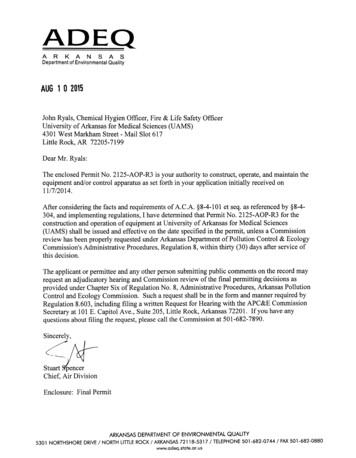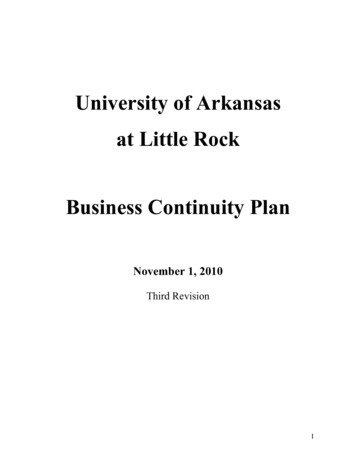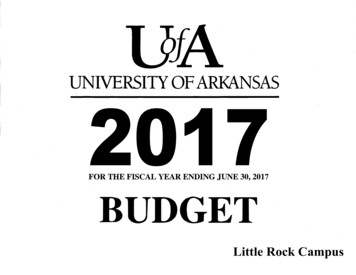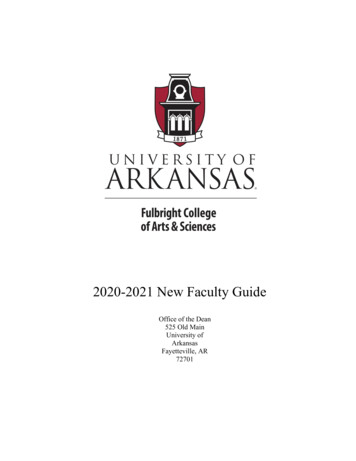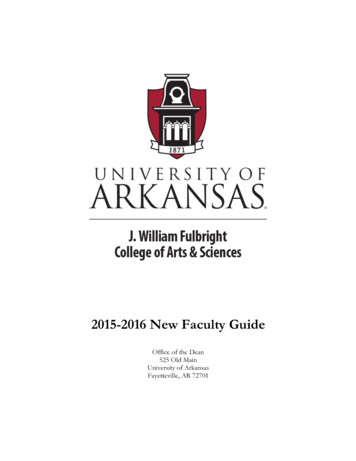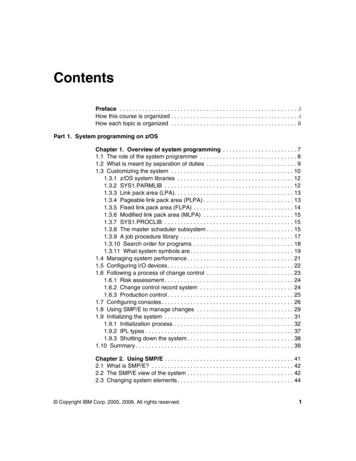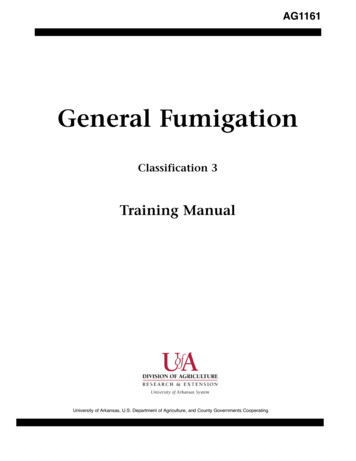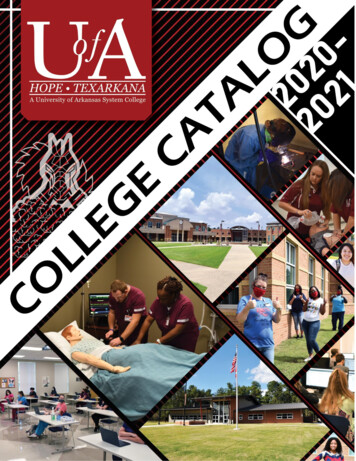
Transcription
University of Arkansas forMedical SciencesDoctoral Internshipin Clinical Psychology2020-2021Training Year
Table of ContentsThe Setting1Doctoral Internship4Child Training Track6Adult Training Track10Neuropsychology Training Applying to Internship25Contact Information27
The SettingLife in Little RockLittle Rock is a scenic city sitting on the south bank of the Arkansas River in Central Arkansas. Itis the capital and most populous city in Arkansas with a 2017 population estimate of 199,000,though the Little Rock metropolitan area is ranked 78th in terms of population with approximately740,000 residents. The size of Little Rock and surrounding area not only gives its residents afeeling of living in a large city with many amenities accessible to them but also has a small townfeel with quiet shops and family-friendly neighborhoods. In fact, in 2014 Little Rock was ranked#1 in “America’s 10 Great Places to Live” by Kiplinger Personal Finance Magazine.Little Rock is a major cultural, economic, educational, medical, government, and transportationcenter within Arkansas, the South, and the country. Fortune 500 companies Dillard’s andWindstream Communications are headquartered in Little Rock, along with Axion, Stevens, Inc.,American Taekwondo Association, and Heifer International. Little Rock boasts a number ofattractions for those who are lovers of art, music, and theater, including the Arkansas Arts Center,Arkansas Repertory Theatre, Robinson Center Music Hall, Wildwood Park for the Arts,Community Theatre of Little Rock, and Ballet Arkansas.The city is probably most well known for being home ofthe William J. Clinton Presidential Library and Museum,which was opened in 2004. The archives and librarycontain 2 million photographs, 80 million pages ofdocuments, 21 million e-mail messages, and nearly80,000 artifacts from the Clinton presidency. Themuseum within the library showcases artifacts fromClinton's term and includes a full-scale replica of theClinton-era Oval Office.William J. Clinton Presidential Library and MuseumLittle Rock is home to a wide variety of other museums, such as the Museum of Discovery,Historic Arkansas Museum, MacArthur Museum of Arkansas Military History, Old State HouseMuseum, and the Mosaic Templars Cultural Center. Little Rock has a proud history of being onthe forefront of the civil rights movement. The Little Rock Central National Historic Site1
commemorates the desegregation of Central High School in 1957 and the persistence of nineAfrican American students in attending a formally all-White school.Outdoor enthusiasts enjoy biking and running on theArkansas River Trail which features more than 15miles of scenic riverfront and the Big Dam Bridge, oneof the longest pedestrian and bicycle bridges in NorthAmerica. Little Rock also has over 60 parks andrecreational areas, and Pinnacle Mountain State Parkis adjacent to the western side of the city. The mostprominent feature of the park is Pinnacle Mountain,which towers over 1,000 feet above the Arkansas RiverValley and includes several hiking trails. The park alsoincludes the Arkansas Arboretum, an interpretive trailwith flora and tree plantings.Pinnacle Mountain State ParkEducation also is an integral part of Little Rock. It is home to two branches of the University ofArkansas system: the University of Arkansas, Little Rock (UALR) and the University of Arkansasfor Medical Sciences (UAMS). Over 12,000 students receive their education at UALR, and theuniversity features over 100 undergraduate degree programs and over 60 graduate degreeprograms. Athletes participate in Division I athletics in the Sun Belt Conference. UAMS is theonly academic medical center in Arkansas and includes the medical school for the University ofArkansas. It also features seven institutions that provide specialized clinical care and research.Sports are important to the culture of Little Rockand to the state of Arkansas. The ArkansasTravelers, the AA professional minor leaguebaseball affiliate of the Seattle Mariners, playtheir home games at Dickey-Stephens Park inNorth Little Rock. War Memorial Stadium inLittle Rock is the second home of the Universityof Arkansas Razorbacks football team who playmost of their home games at Donald W.Reynolds Razorback Stadium in Fayetteville.Dickey-Stephens ParkLinks to Local InformationLittle Rock Visitors Bureau – www.littlerock.comLittle Rock Calendar of Events – www.littlerock.com/calendarLittle Rock Neighborhoods – le Rock River Market – www.rivermarket.info/2
University of Arkansas for Medical SciencesThe University of Arkansas for Medical Sciences(UAMS) is Arkansas’ only comprehensive academichealth center. It is the largest public employer in the statewith more than 10,000 employees in 73 of Arkansas’ 75counties and a regional campus in Northwest Arkansas.UAMS offers 64 baccalaureate, master’s, doctoral,professional, and specialist degree programs andcertificates through their Colleges of Medicine, Nursing,Pharmacy, Health Professions, Public Health, andgraduate school. UAMS also is home to seven instituteswhere specialized clinical care and research areconducted, including the Winthrop P. RockefellerCancer Institute, Harvey & Bernice Jones Eye Institute, Myeloma Institute, Donald W. ReynoldsInstitute on Aging, Jackson T. Stephens Spine & Neurosciences Institute, Translational ResearchInstitute, and the Psychiatric Research Institute. UAMS and its clinical affiliates, ArkansasChildren’s Hospital and the VA Medical Center, are an economic engine for the state with anannual economic impact of 3.92 billion. Due to its wide ranging influence, UAMS is impactingthe health care of Arkansans now and in the future.The Psychiatric Research Institute (PRI) isa state of the art facility that is dedicated toimproving the mental health and wellbeing of residents in Little Rock, the stateof Arkansas, and the country throughevidence-based treatment, innovativeresearch, and quality training andeducation. Clinical programs are dedicatedto treating children, adolescents, and adultsthrough a variety of outpatient clinics andinpatient programs, including the WalkerFamily Clinic, Child Study Center, Centerfor Addiction Services and Treatment,Women’s Mental Health Program, andSTRIVE (Seeking To Reinforce myIdentity and Values Everyday), a school-based community outreach program.In addition to clinical care of psychiatric disorders, research and education are integral to theoverall approach of PRI. The institute’s focus on evidence-based care takes into consideration theeducation of future medical personnel while relying on the work of research scientists to provideinnovative forms of treatment. PRI’s three research divisions are the Center for AddictionResearch, the Division of Health Services Research, and the Brain Imaging Research Center.Educational programs include an APA-accredited doctoral clinical psychology internship, childand adolescent psychology and neuropsychology fellowships, general psychiatry residency, andfellowships in child and adolescent, forensic, addiction, and geriatric psychiatry.3
Doctoral Internship inClinical PsychologyOverviewThe UAMS Department of Psychiatry Internship Training Program in Clinical Psychology isaccredited by the American Psychological Association (APA) and offers training through a ChildFocused Track (Program Code # 110611), Adult-Focused Track (Program Code # 110612) andNeuropsychology Track (Program Code # 110613).Our 2080-hour clinical psychology internship is designed to provide interns with a broad andgeneral training experience in basic principles and techniques of professional psychology. It issponsored by UAMS and Arkansas Children’s Hospital and offers training through adult, child, orneuropsychology tracks. The internship is one of the training programs of the Department ofPsychiatry in the UAMS College of Medicine with multiple training sites – the Walker FamilyClinic, Women’s Mental Health Clinic, and the Child Diagnostic Unit located in the PsychiatricResearch Institute; UAMS Student Wellness Clinic; and the Child Study Center and Burn Centerat Arkansas Children’s Hospital. Psychiatry residents and fellows, as well as social work interns,are also part of the training programs within the department. The internship training year is July 1through June 30 of each year.HistoryThe UAMS clinical psychology internship program was first established in 1961 and was givenfull accreditation by the APA in 1967. The internship developed a child and adolescent focus in1979 following a site visit from APA. The internship added an adult-focused track beginning withthe 2009-2010 training year and a neuropsychology track beginning with the 2017-2018 trainingyear.MissionThe mission of the internship training program is to train doctoral level psychology graduatestudents for the professional practice of clinical psychology in a competent, ethical, and sociallyrelevant manner in order to serve children, adolescents, adults, and families without regard to race,religion, or economic status.Training Model and GoalsWe adhere to a scientist practitioner training model in which our emphasis is on developingprofessional psychologists who can provide culturally competent clinical services to children,adolescents, adults, and families, while working within the community context of each person. Ourgoal is to train doctoral level psychology students so that at the completion of the program theywill be able to demonstrate competency in formal and informal assessment procedures, a variety4
of treatment approaches, and a strong experience base in consultation and multi-disciplinaryteamwork. They will be able to provide services to a diverse population that varies by age, socioeconomic level, ethnicity, rural/urban setting, and type and severity of psychopathology.Training MethodsInterns initially undergo an intensive period of orientation, observation, and supervision in whichthey work closely with and under the direction of supervising psychologists. Interns quickly takean increasingly independent role in clinical services. The nature and structure of supervision issubject to change according to the ability of the interns to function independently. The pace oftraining is such that within a few months interns are expected to function within the service as arelatively independent clinician, albeit with continued supervision.The structure and schedule of the internship program are such that demands and expectationsplaced on interns are moderate at the beginning of the training year and increase as the yearproceeds. Seminars are scheduled so that early topics are more basic in nature and are aimed atproviding interns with general knowledge essential to their major rotation activities, whereas laterseminars are more oriented toward specialized minor rotation activities.Throughout the year interns meet weekly with specialty supervisors specific to each major andminor rotation. In addition, each intern is assigned a primary supervisor for the training year withwhom he or she meets regularly. This person acts as the intern’s advocate and personal advisor, inaddition to clinical supervision as appropriate. Supervision occurs through both individual andgroup formats. Our program encourages continuous informal supervision by means of an “opendoor” arrangement whereby interns can request and receive immediate consultation or supervisionwhen significant clinical or training issues arise.Unique Aspects of the InternshipFaculty emphasize the use of empirically-supported treatments and assist interns in continuing todevelop therapy and assessment skills using these approaches.Child-track interns will have made significant progress towards meeting the nationalcertification/rostering requirements for TF-CBT, PCIT, and/or CPP by the end of internship.12-month rotations allow interns to be able to see patients through completion of treatment.A research rotation allows interns to work with faculty members on a wide range of grant-fundedprojects.Interns work with caring and conscientious supervisors who carefully consider the intern's trainingexperiences, career goals, strengths, and needs in order to develop the most appropriate andeffective training experience.5
Child TrackOverviewThe goal of the child-focused internship track is to provide interns with an array of generalexperiences to broaden their clinical training as well as offer more specialized training in the areaof traumatic stress. Training occurs within the UAMS Child Study Center at Arkansas Children’sHospital and at the Walker Family Clinic and Child Diagnostic Unit, which are housed in thePsychiatric Research Institute on the main campus of UAMS. Year-long rotations include thetreatment of traumatic stress and young children with behavioral problems. Interns also complete12-month rotations conducting psychological evaluations with children and adolescents with abroad range of difficulties in outpatient and inpatient settings. A minor rotation includes 12 monthsof providing therapy with adults. An elective 6-month research rotation also is offered. Theoreticalorientations of faculty include behavioral, cognitive behavioral, social learning, and interpersonal.Child Study CenterThe Child Study Center (CSC) has been offering mental health services to children and familiessince 1955. This center is a major program within the Division of Child and Adolescent Psychiatryand serves children and adolescents from birth through age 17 and their families. The CSC attractspatients from throughout the state for psychotherapy and psychological evaluation services,although the majority of patients are from the Central Arkansas region. This population is raciallyand ethnically diverse, with the majority of patients identifying themselves as Caucasian or AfricanAmerican. Socio-economic status also is diverse; however, the majority of clientele come fromlower income homes. Staff at the CSC includes psychologists, doctoral psychology interns andpostdoctoral fellows, psychiatrists, psychiatry residents and fellows, licensed clinical socialworkers, social work interns, and licensed professional counselors.Training experiences at this site include implementing evidence-based interventions in individualand family modalities, conducting diagnostic assessments, providing psychological testingevaluations, and meeting weekly for individual and group supervision with psychologists whosupervise specialty child areas. All clinical experiences at the CSC are for 12 months.A wide range of general psychotherapy skills, with a focus on cognitive-behavioral and parenttraining approaches, are utilized with children and families representing the full range of problemsnormally presenting to an outpatient clinic. Typical referrals include traumatic stress, ADHD,disruptive behavior disorders, depressive disorders, and anxiety disorders. Due to our statewidereferral base, more rare cases such as pediatric bipolar, psychosis, selective mutism, and others arereferred to this clinic as well. Training in more specialized interventions such as habit reversal,exposure and response prevention, and interoceptive exposure also may occur.In addition to psychotherapy experiences, interns also provide psychological evaluations tochildren and adolescents with a broad range of presenting issues, including ADHD, learningdifficulties, traumatic stress, anxiety, mood problems, Autism Spectrum Disorder, and disruptivebehaviors. Referral questions often include diagnostic clarification, assessment of level of6
functioning, and treatment planning. Interns gain experience in clinical interviewing;administration, scoring, and interpretation of psychological tests and measures; formulation ofdiagnostic impressions and recommendations for intervention; and oral and writtencommunication of assessment findings. Typical psychological testing instruments include tests ofintelligence, achievement, adaptive functioning, executive functioning, attention, and memory, aswell rating forms and diagnostic interviews assessing emotional and behavioral disorders. Inaddition, interns may have the opportunity to conduct psychological testing evaluations for youthwho present with complex trauma who are referred from DCFS and the court system.Specialty PopulationsTrauma-Focused Cognitive-Behavioral Therapy (TF-CBT) – Interns at the CSC provide TF-CBTwith youth who are experiencing mood, anxiety, and/or behavioral problems as a result oftraumatic stress. Children and adolescences seen during this rotation often have experiencedmaltreatment, witnessed domestic violence, resided in foster care, and/or experienced othertraumatic events such natural disasters, medical procedures, or death of loved ones. Interns oftengain experience working with professionals who are a part of the Division of Child and FamilyServices (DCFS) and child dependency courts, including case workers, guardian ad litems,attorneys, court appointed special advocates, and judges. By the end of internship, interns willhave made significant progress towards meeting the national certification requirements for TFCBT. In addition, interns may have the opportunity to implement an evidence-based treatment forpreschool and school-aged children who have developed problematic sexual behaviors as a resultof trauma exposure.Child-Parent Psychotherapy (CPP) – Depending on their interest, interns conduct CPP for childrenbirth through age 5 who have experienced trauma and are currently reporting posttraumatic,behavior, emotional, or attachment-related difficulties. This evidence-based, dyadic treatmentfocuses on strengthening the parent-child relationship, enhancing safe parenting practices, andproviding caregivers and children an opportunity to process trauma. Interns often gain experienceworking with professionals who are a part of our state’s Safe Babies Court Teams (SBCT) or whoare involved with the child welfare system, including case workers, guardian ad litems, attorneys,court appointed special advocates, and judges. They also gain exposure and practice with areflective supervision model, in which they are able to process their own cases and contribute tothe reflective growth of their colleagues. Supervising psychologists are certified CPP state trainers.By the end of internship, interns are able to make significant progress towards meeting the nationalrostering criteria for CPP.Parent-Child Interaction Therapy (PCIT) – Interns are able to obtain training in PCIT, a treatmentfor children ages 2 through 6 who exhibit disruptive and oppositional behavior. PCIT is anevidence-based, dyadic treatment that results in a stronger relationship between caregivers andchildren and use of more effective and appropriate caregiver disciplinary strategies. Internstypically first observe supervising psychologists conduct PCIT with several patients beforetransitioning to being a co-therapist with the psychologist, though supervisors tailor the trainingfor interns who have previous experience with the model. Supervising psychologists are certifiedby PCIT International as Level 1 or Level 2 trainers. By the end of internship, interns will havemade significant progress towards meeting the national certification requirements for PCIT.7
Walker Family ClinicThe Walker Family Clinic has been offering mental health services to young adults, adults, andgeriatric populations since 2008. The clinic was formed by the integration of the UAMS Programfor Adults and Program for Young Adults. This clinic serves the referral needs for inpatient units,UAMS outpatient clinical programs, the community of greater Little Rock, and for secondary andtertiary settings from across the state. The patient population fort the clinic generally reflects theracial and ethnic breakdown of the Greater Little Rock metropolitan area.
Arkansas system: the University of Arkansas, Little Rock (UALR) and the University of Arkansas for Medical Sciences (UAMS). Over 12,000 students receive their education at UALR, and the university features over 100 undergraduate degree programs and over 60 graduate degree programs.
